#roy davis jr
Text









Jerry Lewis
#Film#Jerry Lewis#Photography#Dean Martin#Sammy Davis Jr#Eddie Murphy#Jimmy Durante#Roy Rogers#Joe Piscopo#SNL#Saturday Night Live
18 notes
·
View notes
Photo


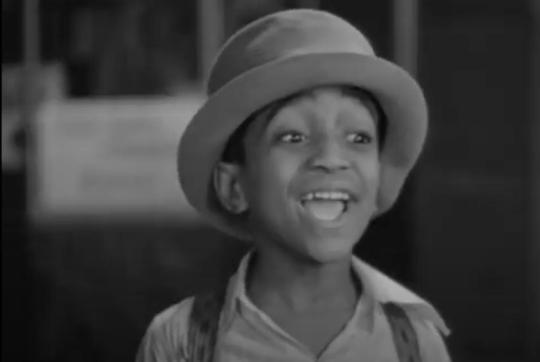
Seasoned Greetings (1933) Roy Mack
December 7th 2022
#seasoned greetings#1933#roy mack#lita grey#carleton macy#sammy davis jr.#george haggerty#the village barn hill billies#the sizzlers#robert cummings#broadway brevities (1933-1934 season) 3; seasoned greetings#pre-code#short
2 notes
·
View notes
Text
TONNERRE DE FEU (1983)






























Frank Murphy est pilote d'hélicoptère à l'Astro Division, la section aérienne du Los Angeles Police Department. Un soir, avec son nouveau copilote Richard Lymangood, il assiste à l'agression mortelle de Diane McNeely, une femme impliquée dans la lutte contre les violences urbaines. Alors que l'affaire est très médiatisée, Frank décide d'enquêter officieusement, persuadé qu'il s'agit d'un assassinat déguisé. Parallèlement, il est chargé de participer aux essais dans le désert des Mojaves d'un nouveau prototype d'hélicoptère ultramoderne destiné à surveiller la foule lors des jeux olympiques d'été de 1984 à venir à Los Angeles. Ce tout nouvel appareil, surnommé « Tonnerre de feu », est piloté par le colonel F. E. Cochrane, que Murphy a connu durant la guerre du Viêt Nam. Cette guerre a laissé des séquelles à Frank, qui souffre de trouble de stress post-traumatique.
#Tonnerre de feu#Blue Thunder#John Badham#Arthur B. Rubinstein#Roy Scheider#Malcolm McDowell#Warren Oates#Candy Clark#Daniel Stern#David Sheiner#Joe Santos#Jason Bernard#Mario Machado#James Murtaugh#Pat McNamara#Jack Murdock#Paul Lambert#Anthony James#Reid Cruickshanks#James W. Gavin#James Read#Lolly Boroff#Ernest Harada#Jerry Ziesmer#Tom Lawrence#Tony Brubaker#Gary Davis#Thomas Rosales Jr.#Peter Miller#Bob Harks
1 note
·
View note
Text
Lucy in Beverly Hills
Part 1 ~ The Cast
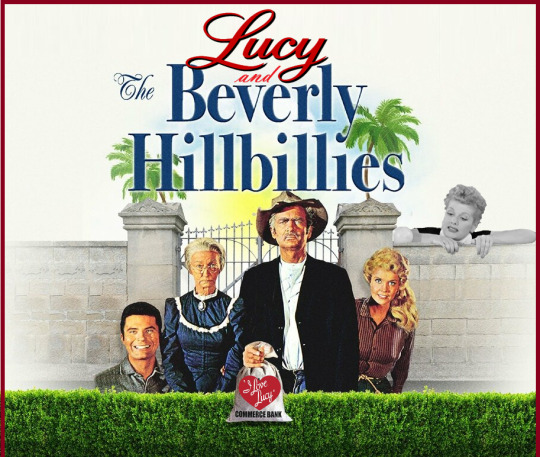
Although thematically the shows created by Lucille Ball were worlds apart from the down-home humor at the Clampett Mansion, there were artistic and creative commonalities that are worth discussing.
"The Beverly Hillbillies" ran from 1962 to 1971, while "The Lucy Show" ran from 1962 to 1968, both on CBS TV. Interiors were filmed at General Service Studios, where "I Love Lucy" began filming until it moved to larger quarters.
Like Jed Clampett, Lucy Carmichael and Lucy Carter are single parents, raising teenage girls, a popular trope of the 1960s and '70s.

The Desilu sitcoms "I Love Lucy," "Make Room for Daddy," "The Andy Griffith Show," and "Gomer Pyle USMC" are all related shows with characters in common much in the same way the Henning sitocms, "The Beverly Hillbillies," "Petticoat Junction" and "Green Acres" were related. Interestingly, "The Beverly Hillbillies" was mentioned during two episodes of "The Danny Thomas Show", in 1963 and 1964.
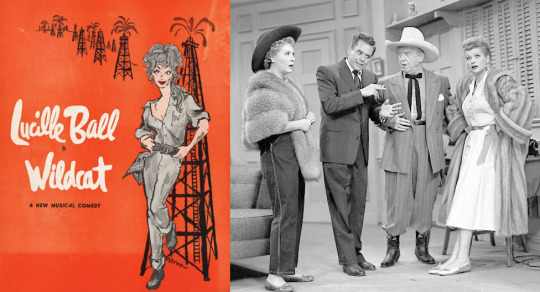
Jed Clampett's fortune is made from striking oil. In the 1960 Broadway musical, Lucille Ball played a wildcatter looking to find black gold. On "I Love Lucy," new neighbors the O'Briens move from Texas, where they made their fortune in oil. Soon the Ricardos and Mertzes have dreams of riches from Texas tea.
Animal trainers Frank and Juanita Inn worked on both shows, as well as on "Here's Lucy."
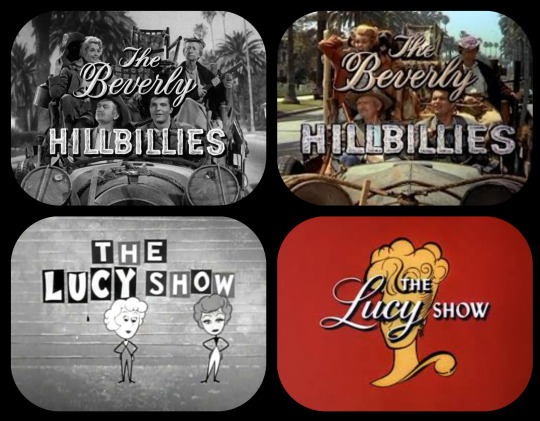
Both shows went from black and white to color in October 1965. Although "The Lucy Show" had filmed its second season in color (1963-1964), CBS declined to air it in color.
Editor Dann Cahn (1963 to 1964), was also an editor for "I Love Lucy" and many Desilu shows.
Shared Casting
Their “Beverly Hillbillies” characters are in parentheses, followed by their Lucycom / Desilu credits.
Irene Ryan (Granny) performed with Lucille Ball on a May 3, 1949 episode of "The Bob Hope Radio Show." In 1963, Ryan and Ball both appeared on CBS specials featuring their TV shows.
Buddy Ebsen (Jed Clampett) appeared in a 1958 episode of "The Westinghouse-Desilu Playhouse" introduced by Desi Arnaz. He appeared with Lucille Ball on several CBS specials and numerous award shows.
Donna Douglas (Ellie Mae Clampett) performed in a 1960 episode of Desilu's helicopter series "Whirlybirds." She was seen with Lucille Ball on a 1963 CBS special "The Stars' Address".
Max Baer Jr. (Jethro Clampett) was seen with Lucille Ball on a 1963 CBS special "The Stars' Address".
Raymond Bailey (Millburn Drysdale) never acted opposite Lucille Ball, but was seen in episodes of Desilu's "The Whirlybirds," "The Untouchables," "The Ann Sothern Show" and "Westinghouse-Desilu Playhouse" introduced by Desi Arnaz.
The bankers of "The Lucy Show" (Theodore J. Mooney) and "The Beverly Hillbillies" (Millburn Drysdale) were remarkably similar: loud, quick-tempered, miserly, abusive to their secretaries, and willing to grovel and sacrifice their dignity to land a big account.
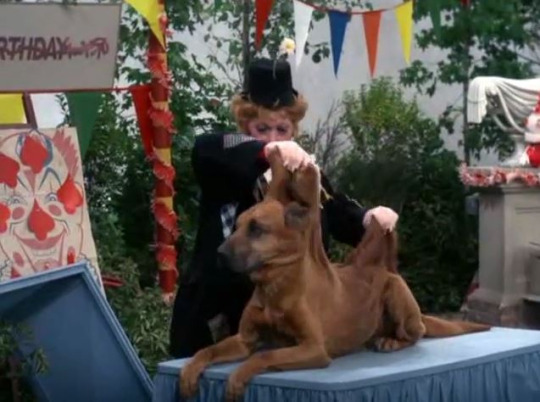
Stretch (Duke) the Clampett's lethargic bulldog, also played Thunderbolt on "Kiddie Parties, Inc." (1963) on "The Lucy Show." Stretch was one of Frank Inn's biggest stars.
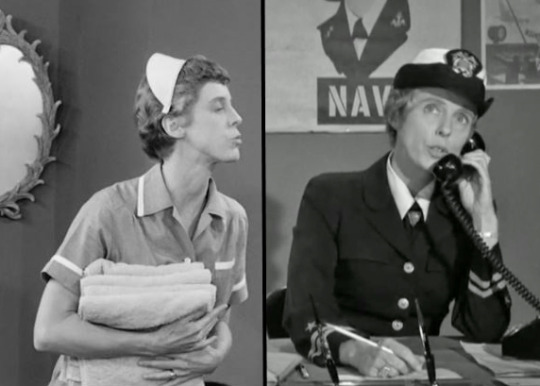
Nancy Kulp (Miss Jane Hathaway) played the Cockney maid who teaches Lucy Ricardo ow to curtsy in "Lucy Meets the Queen" (1955). She also appeared in the Lucille Ball and Desi Arnaz film Forever Darling, again playing a maid. Kulp returned to Desilu for a 1959 special with Milton Berle and Lucille Ball and a 1962 episode of “The Lucy Show” where she played Navy Officer Jane Corey.
Miss Jane's relationship to Mr. Drysdale was not dissimilar to Lucy Carmichael's relationship to her banker boss, Mr. Mooney.

Bea Benadaret (Cousin Pearl Bodine) first starred with Lucille Ball on her radio series “My Favorite Husband” (1948-1951), primarily as best friend Iris Atterbury. Benadaret was Ball’s first choice to play Ethel Mertz on “I Love Lucy,” but she was already contracted to play Blanche Morton on “The George Burns and Gracie Allen Show”, another best friend character. Ball still managed to cast her as a one-off character, Miss Lewis, an elderly spinster, on season one of “I Love Lucy.”
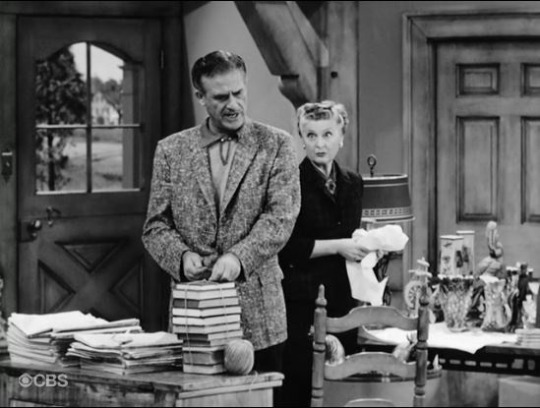
Frank Wilcox (John Brewster) appeared with Lucille Ball in the films Her Husband’s Affairs (1947) and The Fuller Brush Girl (1950). He played Frank Spaulding, owner of the Connecticut house in "Lucy Wants To Move To The Country" (1957).
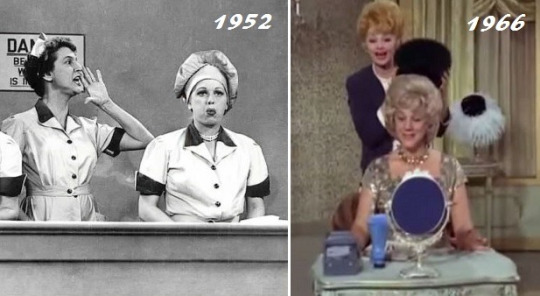
Elvia Allman (Elverna Bradshaw) was heard with Lucille Ball on “My Favorite Husband” before playing the strident Candy Factory Forewoman on “I Love Lucy.” Allman returned to the show as one of Minnie Finch’s neighbors in “Fan Magazine Interview” (1954) and prim magazine reporter Nancy Graham in “The Homecoming” (1955). She made two appearances on “The Lucy–Desi Comedy Hour“ - first as Ida Thompson, Westfield’s PTA director, then as Milton Berle’s private secretary. Allman would also be seen on two episodes of “The Lucy Show" as a customer in a department store and the manager of an employment agency. Allman’s final screen appearance with Lucille Ball reunited her with Bob Hope: “Bringing Back Vaudeville” in 1971. For Desilu, Allman was seen on “December Bride” (1954-59), and “The Ann Sothern Show” (1958).
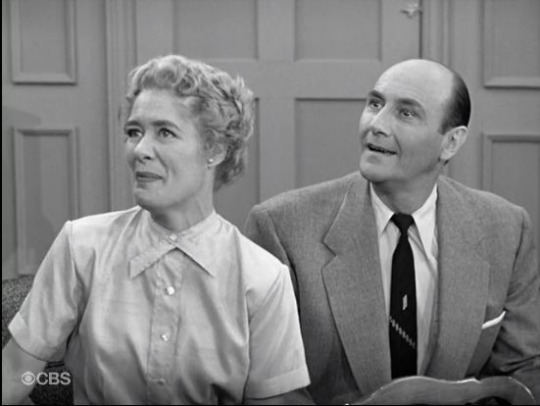
Milton Frome (Lawrence Chapman) played Sam, who Lucy Ricardo tried to fix up with Dorothy, in “The Matchmaker” (1954). He played Milton Berle's agent in a "Lucy Saves Milton Berle" (1965). He also played a waiter in a 1972 episode of “Here’s Lucy” starring Donny Osmond.

Ray Kellogg (Gate Guard / Police Officer) played the barking Assistant Director (“Roll ‘em!”) in “Ricky’s Screen Test” (1954) and later appeared in “Bullfight Dance” (1955). He was seen on 7 episodes of “The Lucy Show” and two episodes of “Here’s Lucy.” In many of his appearances he played policemen or guards, just as he does here.
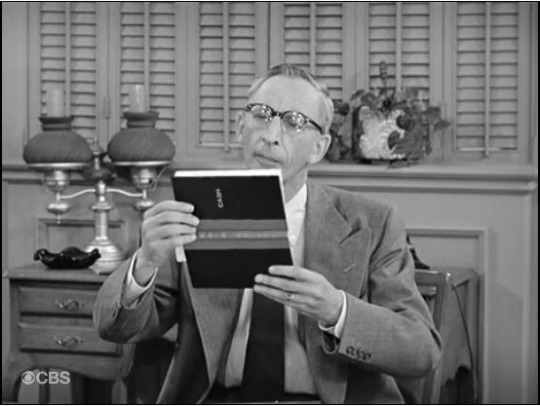
Charles Lane (Foster Phinney / Homer Bedloe / Billy Hacker) appeared in 7 films with Lucille Ball between 1933 and 1949. He was also heard on her radio show "My Favorite Husband". On "I Love Lucy," he played 4 characters and 2 more on "The Lucy-Desi Comedy Hour." He was cast as banker Barnsdahl on "The Lucy Show," but was released after 4 episodes so that Ball could hire Gale Gordon. He went from Desilu to Hooterville with his role of Homer Bedloe on "Petticoat Junction," which he also plays on "The Beverly Hillbillies".
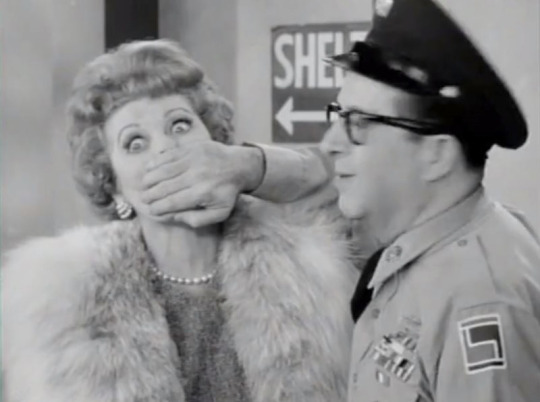
Phil Silvers (Shifty Shafer aka Honest John) gave Lucille Ball a cameo on his show "Sergeant Bilko" in 1959. In 1963, Ball and Silvers performed the classic ‘Slowly I Turn’ sketch for “CBS Opening Night.” In December 1966, Silvers guest-starred as Oliver Kasten in “Lucy and the Efficiency Expert”. A year later Ball and Silvers both had bit parts in the film A Guide for the Married Man (1967).
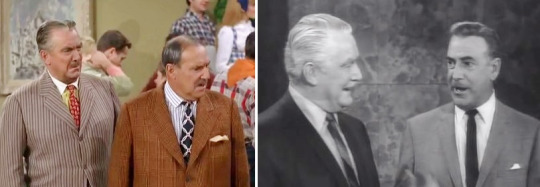
Roy Roberts (John Cushing / Judge) appeared with Lucille Ball in Miss Grant Takes Richmond (1949). On “The Lucy Show” he first appeared as a Navy Admiral in “Lucy and the Submarine” before creating the role of Mr. Cheever, the president of Mr. Mooney’s bank, a recurring character he played through the end of the series. On “Here’s Lucy” he played the Superintendent of the Air Force Academy in season two’s two-part opener. He also played doctors in “Lucy and the Astronauts” (1971) and in "Lucy is N.G. as an R.N." (1973).

Shirley Mitchell (Opal Clampett) became friends with Lucille Ball in the late 1940s when she was featured in 4 episodes of “My Favorite Husband.” Mitchell reunited with Lucille Ball on “I Love Lucy” playing Marion Strong, member of the Wednesday Afternoon Fine Arts League. She also played Mae Belle Jennings on "Petticoat Junction."

Joi Lansing (Gladys Flatt) first worked with Lucille Ball on “I Love Lucy” in “Desert Island” (1956) and returned to play Miss Long Neck in "Lucy Wants a Career" (1959). She did an episode of Desilu's "The Untouchables" and appeared for Desi Arnaz on an episode of "The Mothers-in-Law".
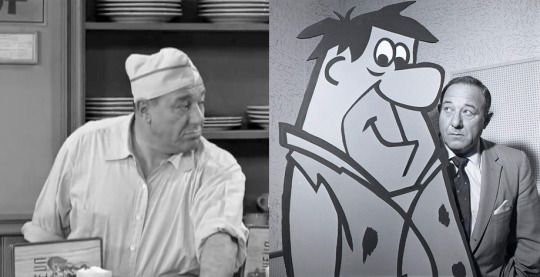
Alan Reed Jr. (Sheldon Epps / Buddy) is probably best remembered as the voice of Fred Flintstone, acting opposite Bea Benadaret (Cousin Pearl). He was heard with Lucille Ball on "My Favorite Husband" (1949). In 1963 he played a café owner in “Lucy Visits the White House”. In 1967, he made an appearance on the Desi Arnaz series “The Mothers-in-Law”.
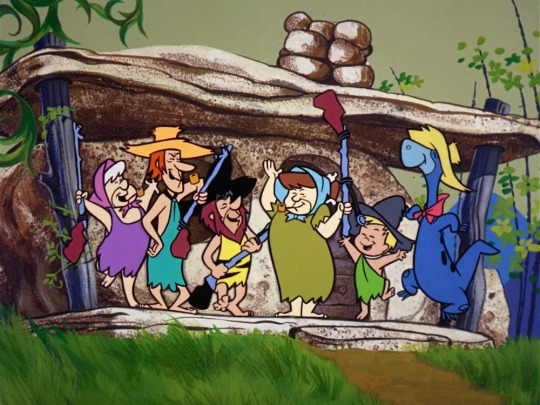
Most of the principal cast of "The Flintstones" (1960-1966) appeared on "The Beverly Hillbillies": Bea Benadaret (Betty), Alan Reed Jr. (Fred), and Mel Blanc (Barney) all appeared on the show. Jean Vander Pyl did not act on "The Beverly Hillbillies," but did appear on its sister show "Petticoat Junction" and voiced Maw on the cartoon "The Hillbilly Bears" (1966). All four also worked with Lucille Ball on radio and/or television. There was also an episode of "The Flintstones" titled "The Bedrock Hillbillies" (above) featuring animated characters named Granny and Jethro Hatrock with voice talent Howard Morris, John Stephenson, and June Foray, all of whom also worked with Lucille Ball.
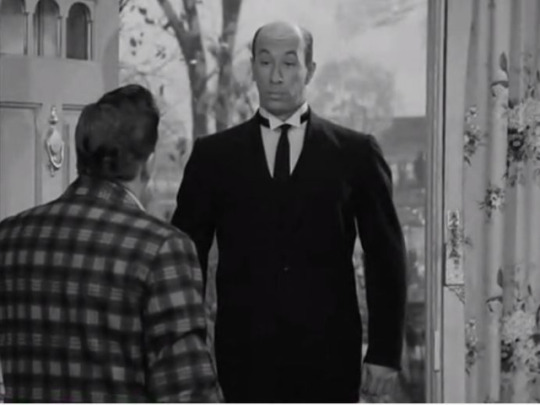
Richard Deacon (Dr. Klinger / Mr. Brubaker) made two guest star appearances on Desilu's “December Bride” in 1956 in one of which he played Desi Arnaz’s butler. It’s not surprising that he was cast as Tallulah Bankhead’s butler Winslow in “The Celebrity Next Door,” a 1957 episode of “The Lucy-Desi Comedy Hour.” In 1963 he played Harvey Rittenhouse in the Ball / Hope film Critic’s Choice. In October 1964, Deacon and Lucille Ball both played themselves on “Bob Hope Presents The Chrysler Theatre: Have Girls, Will Travel”. He was employed again by Desi Sr. as a regular on “The Mothers-in-Law” (1968-69). He was seen on two episodes of "Here's Lucy."
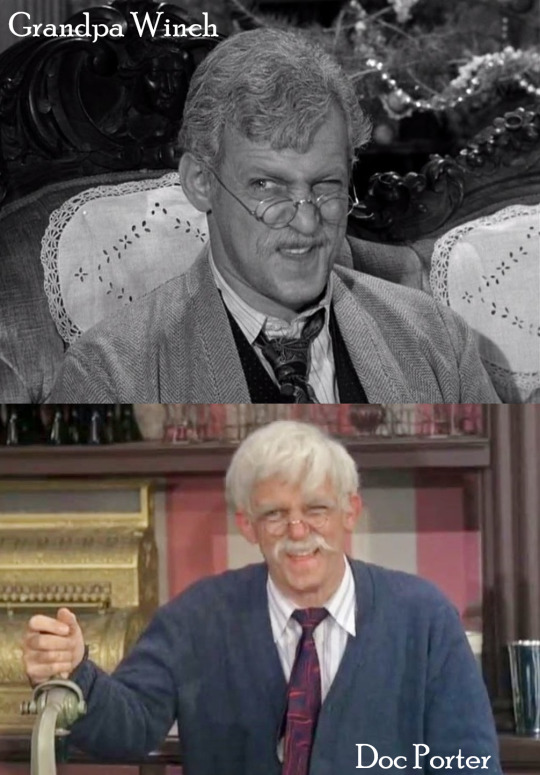
Paul Winchell (Grandpa Winch) was just 40 years old when he donned old age make-up to play Grandpa Winch in "Home for Christmas" (S1;E13). Four years later he was aged again to play Doc Porter on a two-part episode of "The Lucy Show" set in a the small town of Bancroft.
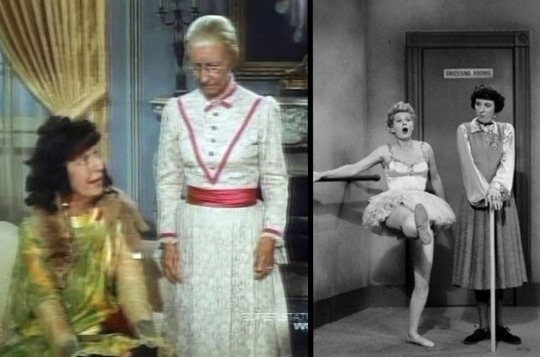
Mary Wickes (Adaline Ashley) was one of Lucille Ball's best friends of screen. She appeared on "I Love Lucy," "The Lucy Show," and "Here's Lucy," in addition to many other TV specials alongside Ball. The 1967 episode of "The Beverly Hillbillies" Wickes appeared on was aired between two of her "Lucy Show" appearances and featured Gail Bonney, who was seen on "I Love Lucy" and "The Lucy Show."

Eddie Albert and Eva Gabor (Oliver and Lisa Douglas) ~ were visitors to Beverly Hills from Hooterville, but both stars were also favorites of Lucille Ball. Gabor appeared in two episodes of "Here's Lucy", one as herself, and Albert played himself in a 1973 episode. In 1950, he co-starred with Lucille Ball in The Fuller Brush Girl.
Star Casting

John Wayne made a cameo appearance on "The Beverly Hillbillies". When asked how he wanted to be paid, he is best remembered answering back with: "Give me a fifth of bourbon--that'll square it." Wayne appeared as himself on "I Love Lucy" (1955) and "The Lucy Show" (1966). His uncredited cameo on "The Indians Are Coming" (S5;E20) was aired in 1967.
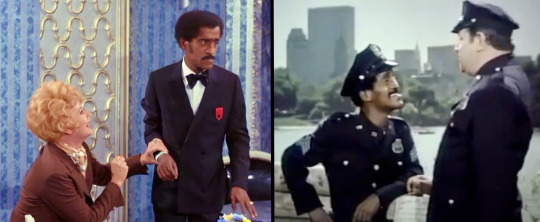
Sammy Davis Jr. (Sergeant Patrick Muldoon) made two appearances on the series during November 1968 episodes set in NYC. Although he plays a character here (an Irish cop!), he played himself on "Here's Lucy" in September 1970. His first "Hillbillies" appearance also features Lucy's friend and co-star Phil Silvers as Shifty Shafer (aka Honest John), a recurring character that was seen in eight episodes.
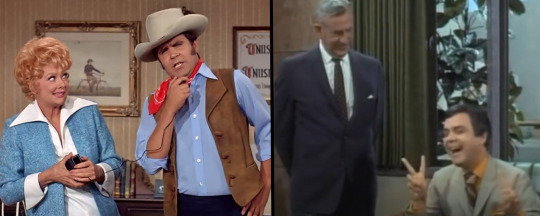
Impressionist Rich Little played himself in the season nine opener of "The Beverly Hillbillies." Mr. Drysdale convinces him to impersonate President Richard Nixon over the telephone to fool Jed. Nixon was one of Little's most popular impressions. When he played himself on a 1971 episode of "Here's Lucy," Nixon wasn't mentioned, but he did do his impression of John Wayne (see above).

Hedda Hopper played herself in "Hedda Hopper's Hollywood" (S3;E4) in 1964, an episode named after her newspaper column and television specials, one of which featured Lucille Ball. That same 1960 special featured Gloria Swanson, who did a cameo as herself in a 1966 episode titled "The Gloria Swanson Story" (S5;E12). Curiously, Hopper played herself in a 1955 episode of "I Love Lucy" titled "The Hedda Hopper Story." An episode of "The Lucy Show" titled "Lucy and the Lost Star" was intended for Swanson, but the lost star eventually cast was Joan Crawford.

Robert Cummings appeared as himself in "The Race for Queen" (S2;E19) playing the celebrity judge of the Queen of Beverly Hills beauty contest. He was known as Bob Collins on "The Bob Cummings Show" (aka "Love That Bob!"), which ran from 1955 to 1959. The same year it ended he played himself on a 1959 episode of "The Lucy-Desi Comedy Hour" set in Japan. He reprised the character of Bob Collins on a 1972 episode of "Here’s Lucy” (above) and returned the following season for another episode as a different Bob. His sitcom had featured many of the same actors as "The Beverly Hillbillies" and various Lucycoms, but especially Joi Lansing, Nancy Kulp, and Elvia Allman. Cummings' appearance on "Hillbillies" is primarily attributable to the fact that BH creator Paul Henning produced "The Bob Cummings Show"!
Other Common Cast Members
Jack Bannon, Wally Cox, Peter Leeds, Bobs Watson, Lyle Talbot, Doris Packer Eleanor Audley, Maurice Marsac, Leon Ames, Jesse White, George Barrows, Herb Vigran, Jean Willes, Norman Leavitt, Leon Belasco, Burt Mustin, Iris Adrian, Foster Brooks, Ted Eccles, Robert Foulk, Tristram Coffin, Byron Foulger, Gil Perkins, Hal Taggart, Robert Cummings, Natalie Schaffer, Mel Blanc, John McGiver, Don Rickles, John Carradine, Jacques Bergerac, Hans Conried, Murvyn Vye, Bernie Kopell, Barbara Morrison, Phil Arnold, Ellen Corby, Robert Carson, Barry Kelley, William Newell, Lurene Tuttle, Karen Norris, Hayden Rorke, Benny Rubin, Helen Kleeb, Bill Quinn, Frank J. Scannell, Irwin Charrone, Gail Bonney, Fritz Feld, Norma Varden, Murray Pollack, Jil Jarmyn, Olan Soule, John Gallaudet, George N. Niese, Dick Winslow, Tommy Farrell, Cliff Norton, Robert Osborne, Nestor Paiva, Larry J. Blake, Hans Moebus, Norman Stevans, Monty O'Grady, Steve Carruthers, and Bert Stevens.
~ Stay Tuned for Part 2 : Episodes ~
#The Beverly Hillbillies#Lucille Ball#The Lucy Show#I Love Lucy#Here's Lucy#TV#CBS#Frank Inn#Nancy Kulp#Bea Benadaret#Hedda Hopper#Rich Little#John Wayne#Sammy Davis Jr.#Eddie Albert#Eva Gabor#Mary WIckes#Paul Winchell#Richard Deacon#Alan Reed Jr.#Shirley Mitchell#Joi Lansing#Frank Wilcox#Elvia Allman#Phil Silvers#Ray Kellogg#Charles Lane#Roy Roberts#Donna Douglas#Irene Ryan
9 notes
·
View notes
Text
@riddlersboyfriend Hi Luke, it's your summer exchange fic!! xoxoxoxo
Don't give it a hand, offer it a soul
Cross-posting on A03 since it's, ya know, long.
First Battalion
CO: Lt Col. Billy Turner. West Point. Demands fawning attention. Shouts. 3/10.
Charlie Company
Capt. Albert Hassenzahl.
From Cincinnati, Ohio. Worked in steel mill.
27 years old
Sometimes brash or impetuous, leading to friction within the unit.
Sufficient. 6/10
Sgt. Roy Speake Jr.
From Birmingham, Alabama. Foreman in cotton mill.
30 years old, yet willing to take orders from younger men.
7/10
Sgt. Mariano Sanchez.
From El Paso, Texas. Family owned a small grocery.
28 years old, difficulty conforming to protocol. Falls behind on runs.
5/10
T/5 John Davis.
From Detroit, Michigan. Janitor.
20 years old, works hard but talks too much.
6/10
Cpl. Harvey White.
From a small town in rural Kansas, farmer.
Age: 19. Inept and unreliable. Poor aim, shirks duties. But could improve if properly motivated.
4/10
Pfc. Paul Devoe.
From New Orleans, Louisiana. Line cook.
Age: 24. Charismatic and optimistic. Keeps spirits up, though impulsivity is an issue.
7/10
Schedule
0600 Reveille
0610 Formation
0630 Tidy barracks
0700 Calisthenics
0800 Wash up
0900 Barracks Inspection
0930 Currahee or obstacle course
1045 PT drills
1115 Outside lecture
1200 Lunch
1330 Mail Call
1345 Lecture/Classroom
1500 Parachute training
1700 Drill
1800 Supper
1900 Lecture/Classroom
2100 Return to barracks
2300 TAPS
Notes September 1942
Dislike Lt. Col. Turner intensely.
Training is more difficult than anticipated.
Seems that what was true in Boston remains true here. Cannot seem to join conversations with the other men, continue to make them uncomfortable. Thought it would be different here than it was back home.
Notes October 1942
Lt. Col Turner is incompetent, stupid, and worthless.
Perhaps other companies have it better; consider orchestrating a change? Investigate.
Notes November 1942
Chose E Company, 2nd Platoon at random, for observation.
Capt. Herbert Sobel
From Chicago, Illinois. Attending University of Illinois.
30 years old
Would be a close friend of Lt. Col. Turner.
2/10
1/Lt. Richard Winters
From Lancaster, Pennsylvania
26 years old, effective. Has the respect of his men. Commands from the front.
8/10
Sgt. Carwood Lipton
From Huntington, West Virginia. Worked in mother’s boarding house.
22 years old, quiet. And yet the men listen.
8/10
Cpl. Donald Hoobler
From Manchester, Ohio, three siblings, joined National Guard.
Age: 20. Young, but works hard.
6/10
Pfc. Joseph Liebgott
Born in Michigan, moved to San Francisco
Age: 27. Cab driver. Speaks German. Easily angered, needs focus.
7/10
Pvt. David Webster
From New York City. Harvard grad. Writer
Age: 20. Lazy, whiny, as bad at talking to others as I am, in a different way.
5/10
Will continue to observe
Notes December 1942
Col. Sink insisted we march 118 miles, from Toccoa to Atlanta. It snowed. It served no function but to boost the egos of men who did not march alongside us.
Companies became disorderly, and by the end we were not marching in our own battalions. As such, I was marching mostly with E Company.
I spoke with Winters, as he was willing to speak with me. For some reason, he does not seem put off by me as others are–perhaps that is because, apart from Lt. Lewis Nixon III of Nixon, NJ, of HQ Company, no one wants to talk to him, either. Nixon certainly does; he made his way all the way over to E Company from the very beginning of the march, and stayed there, right at Winters’ side. By that token, I spoke with Nixon, as well. The march was miserable, but I believe I enjoyed it more than I have enjoyed any other time here.
We did not talk about much of anything of consequence–Nixon ensured that. I think the man is incapable of serious conversation. You would think someone as thoughtful as Winters would dislike him for that, but clearly he does not. It is odd. They are odd.
I observed the other members of E Company as we marched. They are a tight-knit group, more so than C Company by far. It is not because of their CO, that’s certain; he does everything he can to drive them apart, and clearly loathes Winters.
Winters does what he can, but his resources are limited serving under a tyrant, an experience I can sympathize with. In truth, it is the NCOs that hold the Company together. To a man, they work tirelessly to keep spirits up, assisting those who are exhausted, making sure they eat and drink and sleep when they can.
Sgt. Lipton in particular has an interesting way about him. He doesn’t lead like the others, shouting at them to haul ass like Sgts. Guarnere and Martin do, in the time-honored tradition of NCOs. He gives orders, but he does so in a way that is almost friendly. I can’t wrap my head around it.
Notes January 1943
Continuing to observe Sgt. Lipton.
Pvt. Webster is improving, partly because of Sgt. Lipton. (It seems that Pfc. Liebgott has an influence as well, though I can’t fully understand it. To a casual observer–which I do not believe I am–Liebgott bullies him, but in such a way that it almost seems affectionate. It is puzzling). Sgt. Lipton’s approach is different. He encourages Webster (and others, I do not mean to suggest that his efforts are limited to one man–he supports the entire Platoon. Hell, the entire Company) in subtle ways, walking with him to help him keep the pace up, but letting Webster think it’s because he really wants to hear him talk about Impressionist painters or Romantic poets. Perhaps he does. It is difficult to tell; he seems so genuinely engaged.
Capt. Sobel chewed him out for an imaginary offense (a not unusual occurrence in Easy Company) and Sgt. Lipton accepted it with stoicism. But when Sobel turned his back, Sgt. Lipton smirked. He rolled his eyes. There is steel in him.
Notes February 1943
Went for a run with Winters this morning, came across Sgt. Lipton. Winters invited him to join us. Winters runs like a maniac; running with him allows me to push myself, now that we are now longer running Currahee. I expected Sgt. Lipton to decline, particularly given my presence–no NCO has ever wanted to socialize with me–but he did not. He kept pace with Winters easily. He runs very well.
When we finished, we headed for the showers before Reveille, and Sgt. Lipton grabbed towels for each of us, even though it was unnecessary.
Notes March 1943
Have continued to run with Winters every morning. We have not encountered Sgt. Lipton again.
Notes June 1943
Have ceased running with Winters, as it’s too hot and I have concluded that Winters is a lunatic. We have plenty of PT; there’s no need to add on more. I don’t know why I bothered.
Notes August 1943
Couldn’t sleep, as usual. Went out walking through Fort Benning, found myself by the NCO barracks. Stood and smoked for a while. Went back to bed.
Notes September 1943
The S.S. Samaria is miserable. Am crammed into a cabin with Winters, Nixon, Lt. Harry Welsh, Lt. Heyliger, Lt. Roush, and Lt. Meehan from Baker Company. We have to wear life jackets at all times, and Nixon won’t stop talking about how the Titanic didn’t have enough lifeboats, and the Samaria definitely doesn’t.
Sleep is impossible, so have taken to walking the deck at night. Came across Sgt. Lipton, offered him a cigarette even though I know he doesn’t smoke. He described the racks the enlisted men have, and I decided to shut up about my sleeping situation.
He was there the next night, and the next. He didn’t seem to mind my smoking. If he wasn’t on deck in the same place, I would have left him alone–I wouldn’t have gone looking for him. But he was always there, as if he was waiting for me. He didn’t say much, though neither did I, I suppose. We just looked out at the black sea.
Notes November 1943
Sgt. Lipton–and the other Sgts from Easy Company, I suppose–have mutinied on Winters’ behalf. It was brave. It was the right thing to do. It could force Sink’s hand, push him to realize how incompetent Sobel is. (We should try it in First Battalion).
But I don’t know what’s going to happen to them. To him.
Notes December 1943
It’s all right. Two Sgts. were punished, neither of them were him.
It is clear that my interest in Easy Company is not beneficial, and no longer necessary. I am not gaining anything. I should not be more informed on the goings on in a Company that isn’t my own–that isn’t even in my Battalion. I’m going to stop taking notes altogether, anyway–loose lips and all.
Notes May 1944
Have been transferred to Dog Company. If I see Lt. Col. Turner in combat, I’ll kill him.
This is all pointless, anyway. In all likelihood, I am going to die. We are all going to die. Even…even he is going to die.
Notes June 1944
Sgt. Lipton was injured at Carentan, I do not know how badly.
I was also injured. I will recover.
There were some incidents at Normandy. I shot an NCO; he was drunk and endangering the men. I shot six POWs. They were my first kills. I have killed more, since.
The looks men gave me, before we came, as if they weren’t sure what I was capable of.
They know, now. I know, too.
Notes July 1944
Sgt. Lipton was wounded in the groin and on the face. He is in the hospital here in Aldbourne, recovering. He is several beds down from me. He receives visitors throughout the day.
Now that he is up and about, he comes to say hello sometimes, as I am not yet able to walk. He does not avoid me, as the other men do.
He ought to; it would be better if he did. It’s useful that they fear me. It will make me a better leader.
Notes August 1944
Have been transferred to HQ Company, working alongside Nixon. It’s for the best.
Notes December 1944
Have been transferred back to Dog Company, as they are short on officers. We will be needed, I am told, for what’s coming in Belgium.
Notes January 1945
I couldn’t stop watching 1st Sgt. Lipton. With Winters leading the battalion and Lt. Dike as the empty shirt they’ve put in his place, Lipton has been the Company together. He is exhausted–we all are, of course, but it hurts somehow to see it on him. His eyes are shadowed, I could see it even from a distance. I patrolled the lines of Dog Company often, to catch a glimpse of him. I insisted that our medics share supplies, food. I wanted him to eat. To be safe. I was at the edge of the line when German artillery rained down, and I swear I heard him laughing. It was beautiful.
I would have gone across that field at Foy even if Winters hadn’t sent me. Someone had to go, and I was glad it was me. It was the easiest decision I ever made–it wasn’t even a decision, my feet were going before I even had the thought, as soon as they had Winters’ permission to do so.
And now, I’m in command of Easy Company. It feels…right. Like I should have been with them all along. I know these men. I know what they need.
I knew what 1st Sgt. Lipton needed–he needed to know that someone had watched him, had seen what he had done. Had seen the man he is. And so I told him, in a church, while a choir of girls sang in golden light. It was…a risk, because letting him know that allowed him to see me, as well. To an extent.
He still does not seem frightened of me. If anything, he seems a little amused. I don’t know what to make of it, exactly. But I don’t dislike it.
Notes February 1945
I’ve been promoted to Captain. One would think this would be welcome, but it is not. I couldn’t stop thinking of the men who have died, while I’m still here. I tried getting drunk–it’s what everyone else does, Nixon, Welsh, all of them. I’ve never really seen the point, but last night I thought, what the hell, it’s worth a shot.
I’m sharing quarters with 1st. Sgt. Lipton (he should be Lt. Lipton, but it hasn’t come through yet. Promotion won’t ruin him as it has me). I stumbled there, and I was…I couldn’t…I wasn’t as in control of myself as I would have liked to be.
In truth, I wasn’t anything close to control. I came into the tent so drunk I couldn’t see straight, and I was crying. I hadn’t cried before, not once in the entire war. Not with all the deaths. Not for the men who died or the men I killed. But I cried when I got my fucking captaincy.
Lipton was in bed, and I sat down on his cot. Aren’t you supposed to forget things that happen when you’re drunk? Why do I remember all of this?
I remember I tried to kiss him. At least, I think that’s what happened. It is a little fuzzy. All I know is that I was sitting there on his cot and he was in bed, lying down and listening to me, and then I was half on top of him. I think I remember my mouth on his…fuck, you’d think if I’d gone and done something so colossally stupid I would have the decency to be sure about it. You’d think it would be seared into my brain, something I could go back to sometimes, in the privacy of my own thoughts. But there’s nothing, really. Just a vague sense of closeness, of Lipton, right there.
I got to my own bed, somehow. He must have put me there–by that point, I was too drunk to know my own name. And in the morning he greeted me with his usual smile and a cup of extra strong coffee. As though nothing at all had happened. So I guess nothing did.
Notes February 1945
Lipton is sick. He’s been sick for a week or so, but he’s getting worse. It won’t stop. He won’t stop–just keeps acting like he’s fine, even though his fever is running so hot Doc Roe keeps trying to get him off the line. It’s pneumonia, and we’re out here in the cold, and he still won’t go. I’m so furious with him I don’t know what to do.
I can’t watch over him every minute, so I’ve put Luz on him. Luz has the right approach–firm, but with a smile. Lipton doesn’t respond to direct orders; I’ve tried that.
He remains infuriatingly competent, even when he coughs so hard I worry he’s going to drop a lung on my jump boots. Easy is running on fumes, and yet Lipton has it as organized as can be. And I can’t help coming to him for advice, to discuss options, even when he should be resting–because his advice is invaluable to me.
This town, Hagenau, has been blown to pieces. Is still being blown to pieces. We barely have roofs over our heads, though of course that’s practically a luxury, considering some of the places we’ve been. Easy CP is in a building with only one bed, and I’ve put Lipton there. It took some doing–I thought I was going to have to carry him there, and frankly he’s bigger and stronger than I am. Well, maybe not stronger, with pneumonia.
I could sleep in another room, of course, but I’ll be sleeping on the floor, in the same room. I want to be able to hear him if he needs anything, if he takes a turn for the worse.
Notes February 1945
Something happened last night. I don’t…I’m going to write it down, to see if that way I’ll understand it.
At 0230 I went to bed. The patrol did not go well. Two prisoners is not a fair exchange for Jackson. I was…upset. But I still moved quietly, so as not to disturb Lipton–only he was awake. He called me over, asked how the patrol went. I told him.
“I’m sorry, sir.”
“It should never have happened,” I said.
He shrugged, his muscled shoulders moving in the low light from the fire I’d had Luz light in the hearth, and the cooler light from the moon.The room was warm, and he wore only his undershirt. “Lots of things have happened in this war that shouldn’t have, sir.”
I couldn’t argue with that. He slid to the side, gesturing for me to sit down on his bed, as I’d sat a couple of weeks ago, drunk off my head. I obeyed, but I frowned at him, unsure. “What are you doing awake? Can’t sleep? Should I get Roe?”
Lipton shook his head, a little smile on his face. “No. I’m feeling much better, sir. I wanted to see how you are.”
I wasn’t quite sure how to respond. “I…I’m fine?” It sounded like I was asking him for the right answer, but how I was wasn’t something I’d considered in…well, in years, I suppose. Since well before Normandy.
“Good,” Lipton said, taking me at my word. “Would you like some of this?” He held up a bottle and I blinked at it. It was schnapps–I’d taken it from a German couple next door, along with some kind of pastry. Apfelstrudel, they’d called it.
“I don’t really drink,” I said warily, thinking of that other night.
Lipton grinned. “Neither do I, but I figure you got this for me for a reason, right, sir?”
“The woman said it would cure you.”
Lipton held out the bottle to me expectantly, so I took a small sip. It burned going down, too sweet. I handed it back to him, and he took a sip himself, placing his mouth where mine had been. I watched his throat as he swallowed. I was so close to him, I could hear the sound his lips made as they left the bottle. “Another?” he asked.
I shook my head. I didn’t understand what was happening–maybe nothing was happening, maybe this was all perfectly ordinary–but I sure as hell wanted to remember it clearly tomorrow. Lipton took another sip, made a face, and closed the bottle, setting it down on the floor. “Have you had a lot of that?” I asked.
Lipton shrugged, loose. “Some.”
“Enough to cure you then,” I said, and he laughed.
“I guess so.”
I could feel his hip against my leg, and the room got a little brighter with the light of an explosion from a couple of blocks away, and I could only hope it hadn’t done any more damage than we’d already sustained tonight. His eyes are so soft. “I should let you sleep.”
I didn’t stand up, though. I meant to, I meant to get up and go sleep on the floor like I’d insisted I would. I was going to, any second, but I hadn’t yet when Lipton said, “You could sleep here with me.”
I try not to let my emotions show on my face, but I must have looked surprised (I was more than surprised), because Lipton added, “We’ve all slept in tighter quarters than this, in Bastogne. There’s no need for you to sleep on the floor, sir.”
And it’s true. I slept as close as I could to other men in foxholes, because otherwise we would have frozen to death. But this room had a warm fire. There was no reason to. And yet, Lipton slid to the side, making a little more room for me–there wasn’t a lot, it was a small bed–and so I…lay down.
I didn’t take off my boots, or my jacket or anything. I didn’t want to risk taking the time, in case he changed his mind. I lay on my back, but that didn’t quite work, it was too close, so I turned onto my side. I should probably have faced away from him. I didn’t.
His face was right there. I could have kissed him again (did I even kiss him, before? I’ve never been certain). He blinked at me in the darkness, but I didn’t move. Eventually, his eyes closed, but I lay there for a long time, long enough to feel him relax and curl into me. I pressed my lips to his shoulder, and I thought I felt his breath against my hair, but I couldn’t be sure.
When I woke up in the morning, he was gone.
Notes February 1945
I haven’t known what to do with myself all day. Lipton has been hard to pin down–now that he is feeling better, he is working harder than ever. Winters canceled the second patrol, but we still need to act as though it is going forward, which means the same amount of work, plus I needed to make sure Lt. Jones is squared away.
I had Liebgott and the others firing across the river, while Webster and Sgt. Martin hid in the house. By the time I got back to the CP, it was 0300.
Lipton wasn’t in the bedroom waiting for me. He was awake and working with Luz, sorting through the supply delivery. I stopped in to say goodnight and when he said goodnight back, he…well, he smiled at me. But Lipton smiles at everyone.
I don’t like this. I don’t like being uncertain.
Notes February 1945
It’s Lieutenant Lipton now, at long last. Welsh caught up with us, and he had Lipton’s bars with him. I was there when Winters pinned them on, when Lipton shook his hand. There were so many of us there–Nixon, along with Luz and Webster in the other room. Hell, even Lt. Jones was standing there. What felt like it ought to have been a close moment, something for just me and him, wasn’t, couldn’t have been, with so many men around. But of course it wasn’t just for him and me–why would it have been? I’ve only been his CO for a month. Of course he would want to share this with men he’s known for years. He’s earned that and more.
But I was impatient. I couldn’t…after spending yesterday so uncertain, I didn’t want to spend another moment that way. And we were equals now, or almost. We were both officers, at least.
So I took him by the arm and brought him into the other room. It wasn’t private, by any means–they were all still right there, Harry and Nixon drinking from Nixon’s flask, Winters watching them in that amused way he has. And we were going to be heading out soon–I’m writing this in the back of a jeep as Winters drives, in fact. But I couldn’t wait.
“Yes, sir?” he said, expectantly.
I had absolutely no idea what to say. “Um. Yes. Congratulations, Lieutenant.”
He smiled, wide and sincere, that smile that spreads so far across his face that it lifts the downturned corners of his eyes. “Thank you, sir.”
I had to think of something else, some reason to keep him here away from everyone else while I thought of a way to ask what I needed to ask him. “And you’re sure you’re feeling better? Because we could go to an aid station.”
He reached out and squeezed my arm, just below the elbow. It was a little thing, something I’d seen the men do all the time. Hell, Winters and Nixon were never not touching, it seemed. “I promise, I’m fine, sir.”
Just a little thing, but it seemed like I could feel his hand on my skin, even through my coat. No one ever really touches me. “I…” I cleared my throat. “I’m glad to hear that.” His hand slid down, so that his fingers touched the bare skin of my wrist, just resting there. From the other room, it wouldn’t have looked like anything, but it felt like everything. “Lieutenant Lipton…”
“You can call me Lip, you know, sir,” he said. “Everyone else does.”
“Lip,” I repeated, quietly. It probably came out as a whisper. I don’t think I will call him Lip, in front of other people. I think I’ll keep that close.
“Sparky!” Nixon called from the other room. “We’re moving out in an hour, think you can manage that?”
Lipton’s fingers tightened on my wrist before letting go. “Yes,” I said, without looking away from him. I heard the sounds of the other men leaving, of Winters talking to Jones, of Luz giving Webster a hard time, of Welsh and Nixon bantering back and forth. Lipton stepped back, and I felt the moment slipping away, as if this was my only chance, and if I didn’t say something right then–though I still didn’t know what I should say–I would never get another try.
So I reached out and grabbed the back of his neck. His mouth was warm and soft, tasting of coffee and stale bread. He kissed me back, and the relief in that was enough to make me dizzy.
We broke away to catch our breath, and he smiled against my mouth. “Ron,” he whispered.
We had to leave that room, then, and that house full of broken walls and rubble, to gather the men and move on to another house in another town. But he’ll call me Ron again, I believe, when we’re alone. And I’ll call him Lip. And maybe there isn’t anything else that needs to be said, for now.
37 notes
·
View notes
Text
The Round Two Contenders
Hello, all! As we go into round two, I'll be accepting propaganda for only the following nominees:
Sting
Glenn Gould
Link Wray
Curtis Mayfield
Bob Seger
Oscar Peterson
Eric Stewart
Klaus Voormann
Paul McCartney
Gene Autry
Rod Argent
Fang
Freddie Mercury
John Paul Jones
Sly Stone
Tom Scholz
Justin Hayward
Roger Hodgson
Bo Diddley
Rick Wright
Gram Parsons
Geddy Lee
Ray Manzarek
Sam Cooke
Jimi Hendrix
David Gilmour
Noel Redding
Fats Domino
Eric Burdon
Jim Morrison
Bjorn Ulvaeus
Smokey Robinson
Nat King Cole
Dave Davies
Ray Brown
Ron Mael
Ian Curtis
Arlo Guthrie
Micky Dolenz
Syd Barrett
Chuck Berry
Renato Zero
Bruce Springsteen
Al Green
Miles Davis
Bill Bruford
Charles Brown
Mickey Finn
Bob Marley
Eric Dolphy
Neil Peart
Alan Parsons
Brian May
Neil Diamond
Mick Taylor
Robin Zander
Billy Preston
Mik Kaminski
Tony Bennett
Mick Ronson
Steve Miller
Tony Levin
Johnny Cash
Stevie Wonder
Gordon Lightfoot
Frank Zappa
Ernie Ford
David Coverdale
Marvin Gaye
Buddy Holly
Marc Bolan
Rory Gallagher
Todd Rundgren
Willie Dixon
Joe Strummer
Carl Palmer
David Bowie
Alvin Lee
Rick Danko
Clyde McPhatter
Cab Calloway
John Oates
Kenny Loggins
Roy Orbison
John Fogerty
Richie Havens
Ricky Nelson
Denny Laine
Otis Redding
Dave Vanian
John Coltrane
Elton John
BB King
Dean Martin
Rob Grill
Don Henley
Russell Mael
Jimmy Page
Cat Stevens
Tommy Shaw
Robbie Robertson
Phil Ochs
David Byrne
Steve Winwood
Donald Fagen
Carlos Santana
Peter Hammill
Tom Jones
Bev Bevan
Clarence Clemons
Sammy Davis Jr
Robert Lamm
Bobby Darin
Johnny Mathis
Tony Banks
Robert Plant
Brian Eno
Benny Andersson
Barry Gibb
John Deacon
Pete Seeger
Phil Lynott
Andy Gibb
George Harrison
Mickey Hart
Prince
Jack Bruce
Keith Moon
Those in bold have lots of propaganda already, so they're low priority. Rules for submitting propaganda are in the FAQ. If there are multiple people in the photo, please tell me which one the propaganda's for. Good luck to the round two musicians!
31 notes
·
View notes
Text
Actors that were in Alice in Wonderland media and where you might know them better from. Part 2: 1970s-1990s
Part 1 | Part 2(you're here!!) | Part 3
1972-
Michael Crawford as the White Rabbit:
The Phantom/Erik from The Phantom of the Opera
Cornelius Hackel from Hello Dolly!(movie)
Robert Helpmann as the Mad Hatter:
Child Catcher from Chitty Chitty Bang Bang
Michael Hordern as the Mock Turtle:
Jacob Marley from A Christmas Carol(1971)
Davy Kaye as the Mouse:
Admiral from Chitty Chitty Bang Bang
Roy Kinnear as the Cheshire Cat:
Henry Salt from Willy Wonka & the Chocolate Factory
Pipkin from Watership Down
Through the Looking Glass(1973)-
Sarah Sutton as Alice:
Nyssa from Doctor Who
Geoffrey Bayldon as the White Knight:
Dr. Duval from Pink Panther(1976)
Festival of Family Classics(1973)-
Carl Banas as the King of Hearts:
Head Elf from Rudolph the Red-Nosed Reindeer
Scorpion from Spider-Man(1967)
Sweetums from Tales from Muppetland- The Frog Prince
Grandpa Kitty from Hello Kitty's Furry Tale Theater
Bernard Gouran as the Dormouse:
Bumble/Spotted Elephant from Rudolph the Red-Nosed Reindeer
Paul Soles as the Cheshire Cat:
Hermey from Rudolph the Red-Nosed Reindeer
Spider-Man/Peter Parker from Spider-Man(1967)
Stanley Lieber from The Incredible Hulk(2008)
Peg Dixon as the Queen of Hearts:
May Parker/Mary Jane Watson from Spider-Man(1967)
Alice at the Palace(1982)
Meryl Streep as Alice:
Donna Sheridan from Mamma Mia!(movie)
Mrs. Fox from Fantastic Mr. Fox
The Witch from Into the Woods(movie)
Cousin Topsy from Mary Poppins Returns
Dee Dee Allen from The Prom(movie)
Betty Aberlin as Alice's sister:
Herself in Mister Roger's Neighborhood
Debbie Allen as the Queen of Hearts:
Dr. Catherine Avery Fox from Grey's Anatomy
Michael Jeter as the Pig Baby/Dormouse/Bill:
Mr. Noodle from Sesame Street
Steamer/Smokey from The Polar Express
Great Performances(1983)-
Kate Burton as Alice:
Ellis Grey from Grey’s Anatomy
Austin Pendleton as the White Rabbit:
Max from The Muppet Movie
Gurgle from Finding Nemo
Nathan Lane as the Mouse:
Timon from The Lion King
Hammegg from AstroBoy(2009)
Max Dialystock from The Producers
Gomez Addams from The Addams Family(musical)
Geoffrey Holder as the Cheshire Cat:
Narrator from Charlie and the Chocolate Factory
Ray the Sun from Bear in the Big Blue House
(He was also the original director and costume designer for The Wiz(musical)
Eve Arden as the Queen of Hearts:
Principal McGee from Grease
James Coco as the King of Hearts:
Mr. Skeffington from The Muppets Take Manhattan
Donald O’Connor as the Mock Turtle:
Cosmo Brown from Singin’ in the Rain
André De Shields as Tweedle Dum:
Hermes from Hadestown
The Wiz from The Wiz(musical)
Maureen Stapleton as the White Queen:
Mama Mae Peterson from Bye Bye Birdie
CBS(1985)-
Natalie Gregor as Alice:
Jenny Foxworth from Oliver & Company
Sherman Hemsley as the Mouse:
B.P. Richfield from Dinosaurs
Shelley Winters as the Dodo:
Lena Gogan from Pete's Dragon
Sammy Davis Jr. as the Caterpillar:
Josh Howard from Ocean's 11
Robert Axelrod as the Frog Footman:
Lord Zedd from Mighty Morphin' Power Rangers-The Movie
Telly Savales as the Cheshire Cat:
El Sleezo Tough from The Muppet Movie
Roddy McDowall as the March Hare:
Mr. Soil from A Bug's Life
Jervis Tetch from Batman the Animated Series
Ringo Starr as the Mock Turtle:
The Beatles
Carol Channing as the White Queen:
Dolly Gallagher Levi from Hello Dolly!
Harvey Korman as the White King:
The Great Gazoo from The Flintstones
Sally Struthers as Tiger Lily:
Rebecca Cunningham from TaleSpin
Pat Morita as the Horse:
Mr. Miyagi from The Karate Kid
The Emperor of China from Mulan
Jonathan Winters as Humpty Dumpty:
Grandpa Smurf from The Smurfs
John Stamos as the Messenger:
Jesse Katsopolis from Full House
Iron Man/Tony Stark from Spidey and His Amazing Friends(put this here cause i thought it was funny)
Anglia TV(1985)-
Joan Sanderson as the Queen of Hearts:
Dorcas from The Great Muppet Caper
Bernard Cribbins as the Mock Turtle:
Wilfred Mott from Doctor Who
BBC(1986)-
Elisabeth Sladen as the Dormouse:
Sarah Jane Smith from Doctor Who
Michael Wisher as the Cheshire Cat:
Davros and the Daleks in episodes that the character was involved in from Doctor Who
Roy Skelton as the Mock Turtle:
Daleks for The Evil of the Daleks(and 5 other episodes) from Doctor Who
Carebears in Wonderland(1987)-
Tracey Moore as Alice:
Cheer Bear from The Carebears Family
Share Bear from Too Many Carebears stuff to list
Emma Frost from X-Men(1992)
Sailor Moon from Sailor Moon(1995)(Ep. 1-11,15, and 21)
Princess Toadstool from The Adventures of Super Mario Bros 3
Don McManus as the Caterpillar:
David Madsen from Life is Strange
Elizabeth Hanna as the Queen of Wonderland:
Grandma/Mama Kitty from Hello Kitty's Furry Tale Theater
Through the Looking Glass(1987)-
Janet Waldo as Alice:
Judy Jetson from The Jetsons
Josie from Josie and the Pussycats
Townsend Coleman as Tom Fool:
The Tick from The Tick
Michaelangelo/Splinter/Krang/Shredder from Teenage Mutant Ninja Turtles(1987)
Phyllis Diller as the White Queen:
Queen from A Bug's Life
Hal Smith as the Bandersnatch:
Owl from Winnie the Pooh(until 1991)(was also the first replacement for Pooh bear himself)
Josiah from Halloween is Grinch Night
Gyro Gearloose/Flintheart Glomgold from Ducktales
Phillipe from Beauty and the Beast
Jonathan Winters as the Tweedles:
Papa Smurf from The Smurfs
Alan Young as the White Knight:
Scrooge McDuck from Ducktales
Farmer Smurf from The Smurfs
Mr. T as the Jabberwock:
Mr. T
B.A. Baracus from The A-Team
Clive Revill as the Snark/Goat:
King Nod from The Thief and the Cobbler(1993,1995)
Kickback from The Transformers-The Movie
Will Ryan as the Paper Man:
Petrie from The Land Before Time
Willie the Giant from Mickey's Christmas Carol(and until his death in 2021)
Harold the Seahorse from The Little Mermaid
Digit/Moe from An American Tail
Burbank(1988)-
Keith Scott as the White Rabbit/March Hare/Dodo:
Gordon/Diesel 10 from Thomas and the Magic Railroad
Dudley Do-Right/Inspector Fenwick from Dudley Do-Right's Ripsaw Falls
Popeye/Bluto from Popeye & Bluto's Bilge Rat Barges
Funky Fables(1988)-
Norma MacMillan as the Narrator:
Casper from The New Casper Cartoon Show
Gumby on The Gumby Show
Doug Parker as the Rabbit/Frog/Mouse:
Shredder from Ninja Turtles- The Next Mutation
Richard Newman as the Caterpillar:
General Cryptor/Emperor of Ninjago from Ninjago
Professor Slopsink from Johnny Test
Cranky Doodle Donkey from My Little Pony- Friendship is Magic
Mr. Turtle from Franklin
Rhinox from Beast Wars
Alvin Sanders as the Cheshire Cat:
King Sombra(season 9) from My Little Pony- Friendship is Magic
Manten from Inuyasha
Philip Hayes as the Hatter/Hare/Rat:
Scratch from The Adventures of Sonic the Hedgehog
Mike Donovan as the King of Hearts:
Yang from Ninjago
Spike from Tom and Jerry Tales(2006)
Lynda Boyd as Alice's sister:
Nora Carpenter from Final Destination 2
Cheryl from She's the Man
Adventures in Wonderland(1992)-
Patrick Richwood as the White Rabbit:
Neighbor Mr. Robutsen from The Princess Diaries
Harry Waters Jr. as Tweedle Dee:
Marvin Berry from Back to the Future
John Lovelady as the Dormouse:
Crazy Harry from The Muppets(Season 1)
Terri Garr as the Duchess:
Mary McGinnis from Batman Beyond
Ken Page as the Walrus:
Oogie Boogie from The Nightmare Before Christmas
Old Deuteronomy from Cats the Musical
Gilbert Gottfried as Mike McNasty:
Iago from Aladdin
Kraang from Teenage Mutant Ninja Turtles(2012)
Mister Mxyzptlk from Lego Batman 3
Marlee Matlin as April Hare:
Melody Bledsoe from Switched at Birth
1995-
Mike Donovan as the Narrator:
Yang from Ninjago
Spike from Tom and Jerry Tales(2006)
Doug Parker as the March Hare:
Shredder from Ninja Turtles- The Next Mutation
Ian James Corlett as the White Rabbit:
Mr. Mint from Candy Land- The Great Lollipop Adventure
Cheetor from Beast Wars
Hugh Test from Johnny Test
The Conductor from Dinosaur Train
Skales from Ninjago
Blinky from Pac-Man and the Ghostly Adventures
Through the Looking Glass(1998)-
Penelope Wilton as the White Queen:
Isobel Crawley from Downtown Abbey
Ian Holm as the White Knight:
Ash from Alien
Bilbo Baggins from Lord of the Rings
Chef Skinner from Ratatouille
Steve Coogan as the Gnat:
Octavius from Night at the Musuem
Silas Ramsbottom from Despicable Me 2
1999-
Tina Majorino as Alice:
Deb from Napoleon Dinamite
Dr. Heather Brooks from Grey's Anatomy
Miranda Richardson as the Queen of Hearts:
Ms. Tweedy from Chicken Run
Madame Giry from The Phantom of the Opera(2004)
Rita Skeeter from Harry Potter movie franchise
Martin Short as the Hatter:
Huy from The Prince of Egypt
B.E.N. from Treasure Planet
Jack Frost from Santa Clause 3- The Escape Clause
Stefano from Madagascar 3- Europe's Most Wanted
Jester from Legends of Oz- Dorothy's Return
Grandpa Frump from The Addams Family(2019)
Preminger from Barbie as the Princess and the Pauper
The Cat in the Hat from The Cat in the Hat Knows a Lot About That!
Whoopi Goldberg as the Cheshire Cat:
Shenzi from The Lion King
Gaia from Captain Planet and the Planeteers
Queen Constantina from Rodgers and Hammertsein's Cinderella
Ursula from Descendants 2
Gene Wilder as the Mock Turtle:
Willy Wonka from Willy Wonka & the Chocolate Factory
Dr. Frederick Frankenstein from Young Frankenstein
Robbie Coltrane as Tweedle Dum:
Rubues Hagrid from Harry Potter movie franchise
Christopher Lloyd as the White Knight:
Doc Brown from Back to the Future
Profesor Plum from Clue
Judge Doom from Who Framed Roger Rabbit
Merlock from Ducktales the Movie- Treasure of the Lost Lamp
Uncle Fester from The Addams Family(1981)
Rasputin from Anastasia
Ben Kingsley as Major Caterpillar:
Mandarin from Iron Man 3
Bagheera from The Jungle Book(2016)
Peter Ustinov as the Walrus:
Prince John from Robin Hood
Pete Postlethwaite as the Carpenter:
Narrator from James and the Giant Peach
Friar Lawrence from Romeo+Juliet
Liz Smith as Miss Lory:
Grandma Georgina from Charlie and the Chocolate Factory
Joanna Lumley as Tiger Lily:
Aunt Spiker from James and the Giant Peach
Lady Maudeline Everglot from Corpse Bride
Murray Melvin as the Executioner:
Ernest Reyer from The Phantom of the Opera(2004)
#alice in wonderland#alice’s adventures in wonderland#through the looking glass#adaptations#javi rambles
8 notes
·
View notes
Note
Hey whats up! What're your favorite jazz artists in these subgenres cause im looking for new shit to listen to and sources have informed me you're a bigger jazz fan than me:
-Smooth Jazz
-Jazz Fusion (like synth rock fusion type shit)
-Bossa Nova
-Acid Jazz
hello, you have come to the right place! I want to preface the following list by saying that there's a bit of overlap, as smooth jazz, acid jazz, and a decent amount of jazz fusion artists live in the umbrella of "contemporary jazz" (which also includes easy listening like Kenny G or smooth R&B like Sade).
all that being said, here's a few artists I feel exemplify their genre:
smooth jazz (to note: the term "smooth jazz" is controversial in jazz circles as some people claim it's not jazz at all. I disagree with that stance (obviously), though I will say that it's probably the least "jazzy" genre of jazz, at least since Glenn Miller and his milquetoast band back in the 30s and 40s): Bob James, Fourplay (supergroup with several headliners in the band, including Bob James), Boney James, Grover Washington Jr., Dave Koz, Joe Sample, Michael Franks, Spyro Gyra, Lindsey Webster
jazz fusion (alluded to this above but jazz fusion itself refers to jazz blends with other genres, some of which can get pretty out there.. given that you approached me, the smooth jazz guy, about this, I'll stick to the groups more firmly rooted in jazz, though I wanted to point out that this is a wide and varied genre): Pat Metheny Group (listen to them if you ignore everything else), George Duke, Fattburger, Yulara, The Rippingtons, Snarky Puppy, Herbie Hancock, Miles Davis (later stuff specifically), Steely Dan
Bossa Nova (to note here, there are a lot of jazz artists that play with Bossa Nova elements, but to keep this list neat, I'm restricting this to Bossa Nova players specifically. I'm also, as you can tell, less of a straight ahead bossa nova guy): Sergio Mendes!, Joao Gilberto, Antonio Carlos Jobim, Stan Getz
Acid Jazz (if someone refers to "persona 5 music", it's acid jazz): Kombo, Incognito, Thundercat, Roy Ayers, Jamiroquai (they're jazz adjacent!)
happy to offer something a bit more refined if you want, but I actively listen to all of these artists!
14 notes
·
View notes
Text
trying to watch all that jazz. distracted by the way roy scheider looks like a white sammy davis jr.
4 notes
·
View notes
Note
If you had to listen to 10 albums or bands for the rest of your life, what would they be?
Bowling Green-the Kossoy Sisters
Legendary Demos-Carole King
The Wham of Sam-Sammy Davis Jr.
It's Raining-Irma Thomas 45 single bootleg comp)
Company-original cast recording
Drummer Man-Gene Krupa with Anita O'Day and Roy Eldridge
Ella Sings the Rodgers and Hart Song Book Ella Fitzgerald
Sandie-Sandie Shaw
Songs from the Film Privilege-Paul Jones
Top Hat-Fred Astaire
57 notes
·
View notes
Text
@catttooo tagged me to share some music:
Last song I listened to:
Friend lent me this record on Monday night, wasn't familiar with it and it's interesting.
Current favourite song:
'Song of my choice' (as if I didn't choose all of these):
Have an all time fave.
5 notes
·
View notes
Text
LÉGENDES DU JAZZ
ART PEPPER, LE SURVIVANT
‘’Pepper was the embodiment of the West Coast "cool" style. He's very individual. You can hear it. You know it. Art was a very lyrical player. Especially at a time when most of the alto players were in a Charlie Parker bag, Art had a distinct style of his own."
- Shelly Manne
Né le 1er septembre 1925 à Gardena, en Californie, Arthur Edward Pepper Jr. était le fils d’Arthur Pepper Sr., un machiniste qui était devenu plus tard matelot de la marine marchande, et de Mildred Bartold. Pepper avait eu une enfance difficile, car ses parents étaient alcooliques et faisaient souvent preuve de violence.
Ses deux parents étant alcooliques, Pepper avait été élevé par sa grand-mère paternelle.
Pepper, qui avait grandi dans un environnement musical (le cousin de sa mère, Gabriel Bartold, était un prodige de la trompette), avait commencé à jouer de la clarinette à l’âge de neuf ans. Son premier professeur était Leroy Parry. Pepper était passé au saxophone alto trois ans plus tard. Plus jeune, le père de Pepper l’emmenait souvent dans des boîtes de nuit où il lui faisait jouer de la clarinette afin d’impressionner les clients, ce qui lui permettait de se faire un peu d’argent de poche.
Lorsque Pepper avait commencé à s’intéresser au jazz, ses idoles étaient Benny Goodman et Artie Shaw. Il appréciait aussi l’orchestre de Jimmy Lunceford, et plus particulièrement le saxophoniste alto Willie Smith. Le cornettiste Mugsy Spanier était un autre de ses préférés.
Au cours de son adolescence, Pepper avait été particulièrement influencé par d’autres saxophonistes comme Benny Carter, Charlie Parker, Lester Young et Lee Konitz. Pepper considérait Lester Young comme « le plus fantastique saxophoniste de tous les temps — égalé beaucoup plus tard par le seul John Coltrane.’’ Il avait ajouté: ‘’Il était meilleur que Charlie Parker, à mon humble avis. ».
Même si Pepper n’avait pas tellement apprécié Parker au début, il était revenu sur sa position par la suite. Pepper avait déclaré: « J’avais découvert Parker et je n’avais pas aimé. Ça me semblait trop rude […] Bird avait une bonne oreille pour les transpositions, un grand sens du blues et c’était un grand technicien. Il pouvait jouer très vite, et ses lignes étaient magnifiques. Tout était pensé chez lui ; tout avait un sens. Je n’ai jamais aimé ce son, mais, c’est une affaire de goût personnel […] Maintenant, quand je réécoute, j’aime tout. C’était un génie. »
Pepper avait aussi une admiration sans bornes pour John Coltrane. Pepper écrivait dans son autobiographie: « Mais alors, quand j’ai entendu Coltrane ! A la fin des années cinquante, j’ai entendu Coltrane avec Miles Davis, sur le disque Kind of Blue. Il y avait tout ce que l’on pouvait imaginer : plus de notes que Bird, un jeu plus complexe, et j’en aimais le son. Tout ce qu’il jouait se tenait, avait un sens pour moi. Il me touchait. C’est le seul type qui m’ait un jour fait dire : « Je donnerais mon bras droit pour jouer comme ça ! ». Pepper admirait aussi Miles Davis, Dizzy Gillespie, Ray Brown, Paul Cambers, Philly Joe Jones, Zoot Sims, Gil Evans et Gerry Mulligan. Quant à Stan Getz, il trouvait sa musique trop ‘’glaciale.’’
A l’âge de quatorze ans, Pepper avait joué du saxophone alto avec le groupe de son high school dans le cadre de soirées de danse. Un an plus tard, il avait commencé à improviser sur Central Avenue, le principal quartier de couleur de Los Angeles où on retrouvait de nombreuses boîtes de nuit. À l’époque, Central Avenue était pour Los Angeles une sorte d’équivalent de la 52e rue pour la ville de New York.
UNE CARRIÈRE PROMETTEUSE
Pepper, qui avait appris principalement la musique en autodidacte, avait seize ans lorsqu’il avait commencé à se produire au Ritz et l’Alabam, deux clubs de Los Angeles, tout en poursuivant parallèlement ses études. Au Ritz et à l’Alabam, Pepper avait commencé à improviser avec des musiciens comme Louis Armstrong, Roy Aldridge, Jimmy Blanton, Johnny Hodges, Coleman Hawkins, Ben Webster et Dexter Gordon. Impressionné par le talent de Pepper, Gordon l’avait présent au batteur Lee Young, le frère de Lester Young. Young était vite devenu une sorte de mentor pour Pepper, et l’avait présenté au légendaire saxophoniste Benny Carter. À l’époque, Pepper a seulement dix-sept ans.
Dans son autobiographie, Pepper racontait son séjour dans l’orchestre de Carter:
"I had never played much lead alto, so with Benny I played second alto, he played lead, but in my book I had two parts written in most of the arrangements and sometimes, if there wasn't a large audience, Benny would just get off the stand and let me play his parts. I'd get all his solos. I learned that way how to play lead in a four-man saxophone section. And I learned a lot following Benny, listening to his solos, what he played against the background."
Carter étant sur le point de partir en tournée dans les États du Sud, il avait jugé préférable de ne pas exposer le jeune Pepper à une autmosphère de confrontation raciale, d’autant plus que son orchestre était uniquement composé de musiciens de couleur. Carter avait donc décidé de lui faire passer une audition avec l’orchestre de Stan Kenton. Ce dernier avait tellement été impressionné par le talent de Pepper qu’il l’avait aussitôt engagé comme premier saxophoniste alto.
Après avoir écouté les arrangements complexes de Kenton, Pepper n’avait pas tardé à se rendre compte qu’il avait besoin d’en apprendre davantage sur la théorie musicale afin d’exécuter plus efficacement ses solos. C’est le saxophoniste ténor de Kenton, Red Dorris, qui était venu à la rescousse de Pepper.
Après avoir entendu le jeune Pepper jouer pour la première fois, le guitariste Johnny Martizia avait déclaré: ’’Quel son splendide ! […] Je n’en croyais pas mes yeux. ». À l’époque, Pepper avait aussi commencé à partager la scène avec de grosses pointures comme Coleman Hawkins, T-Bone Walker, Dexter Gordon, Charles Mingus, Slick Jones, Art Tatum, Ben Webster, Johnny Hodges, Roy Eldridge et même son idole Lester Young.
Pepper s’était joint par la suite au grand orchestre de Stan Kenton, avec qui il était parti en tournée jusqu’à sa mobilisation en 1943. C’est aussi avec Kenton que Pepper avait fait son premier enregistrement la même année.
Peu après son 18e anniversaire de naissance, Pepper avait reçu son avis de mobilisation. Il a été enrôlé en février 1944. À l’époque, Pepper venait tout juste d’épouser son amie de coeur de seize ans, Patti Moore. Avant que Pepper n’ait eu le temps de partir outre-mer, Patti avait donné naissance à une fille, Patricia Ellen, qui était née le 5 janvier 1945.
Après avoir passé quelques mois en Angleterre, Pepper avait été affecté à la police militaire comme sergent de la garde chargée de la surveillance de Malborough Street Jail à Londres. Durant son séjour à Londres, Pepper avait aussi eu l’occasion de jouer à l’Adelphi Theater, ce qui lui avait permis de rencontrer les meilleurs musiciens de jazz britanniques comme George Shearing et Victor Feldman. Il avait également joué en concert avec le groupe de Ted Heath.
Après la guerre, Pepper était retourné à Los Angeles. En 1947, Pepper s’était joint à un autre groupe dirigé par Kenton, le Kenton Innovations Orchestra, avec lequel il était demeuré jusqu’à la fin de 1951 avant de former son propre groupe. À l’époque, l’orchestre de Kenton comprenait plusieurs grands musiciens de jazz comme les trompettistes Maynard Ferguson et Shorty Rogers, les joueurs de trombone Kai Winding et Milt Bernhart, les saxophonistes Bob Cooper et Bud Shank, ainsi que le batteur Shelly Manne.
Au cours de cette période, Pepper avait également joué avec Zoot Sims, Chet Baker (avec qui il avait enregistré deux albums à succès) et Stan Getz.
Pepper avait quitté l’orchestre de Kenton à la fin de 1951, car il en avait assez des tournées incessantes.
Dans les années 1950, Pepper était reconnu comme un des meilleurs saxophonistes alto du jazz. Il s’était d’ailleurs classé immédiatement derrière Charlie Parker comme meilleur saxophoniste lors d’un sondage des lecteurs du magazine Down Beat en 1952. Avec Chet Baker, Gerry Mulligan et Shelly Manne, Pepper avait souvent été associé au jazz de la Côte ouest, par opposition au jazz de la Côte est qui mettait en vedette Charlie Parker, Dizzy Gillespie et Miles Davis, même si au niveau du style, il était davantage apparenté à ces derniers.
Musicien très lyrique et très mélodique, Pepper avait souvent été comparé à des saxophonistes alto comme Lee Konitz et Paul Desmond. Comme l’affirmait le batteur Shelly Manne, ‘’Pepper was the embodiment of the West Coast "cool" style. He's very individual. You can hear it. You know it. Art was a very lyrical player. Especially at a time when most of the alto players were in a Charlie Parker bag, Art had a distinct style of his own." Un autre ancien membre de l’orchestre de Stan Kenton, le saxophoniste ténor Bob Cooper précisait: "I always felt that Art's major influence was Lester Young; that came out more clearly when I heard him playing tenor a few times... And to transfer that beautiful sound to the alto!... I think his sound wasby far the best alto sound at the time."
Au début de 1952, Pepper avait formé un premier groupe avec le contrebassiste Joe Mondragon, le batteur et vibraphoniste Larry Bunker et le pianiste Hampton Hawes. Au cours de cette période, il avait aussi travaillé avec les batteurs Bud Rich et Shelly Manne. C’est aussi en 1952 que Pepper avait réalisé ses premiers enregistrements sous son nom. Il a aussi enregistré avec d’autres anciens membres de l’orchestre de Kenton comme Shorty Rogers et Shelly Manne. Pepper avait signé un contrat avec les disques Contemporary en 1957.
PROBLÈMES DE CONSOMMATION
Pepper avait connu une adolescence plutôt turbulente. Abandonné à lui-même, il avait commencé à courir les rues, à se battre, à boire et à consommer une série de drogues douces. Il faisait aussi souvent l’école buissonnière.
Dans les années 1940, Pepper avait développé une dépendance envers l’héroïne, ce qui lui avait mérité plusieurs peines d’emprisonnement. Après son arrestation pour possession d’héroïne en 1953, Pepper avait été enfermé durant quinze mois au Fort Worth U.S. Public Health Service Hospital. Un malheur arrivant rarement seul, sa femme Patti en avait profité pour divorcer et se remarier.
Pepper était de nouveau retourné vers ses anciens démons après sa libération en mai 1954. Arrêté en décembre, il avait été envoyé à la prison du comté de Los Angeles, puis à Terminal Island, où il avait passé environ un an. Au milieu de l’année 1960, Pepper avait purgé une peine de prison de quatre-vingt-dix jours, avant d’être envoyé à San Quentin et à Tehachapi où il avait été enfermé durant quatre ans et demi. Trois mois après sa libération, Pepper avait échoué un test de drogue, ce qui lui avait valu six mois de détention au Chino Institute for Men. Libéré sur parole, Pepper avait de nouveau été emprisonné à San Quentin après avoir enfreint ses conditions de libération. Il a été libéré en 1966.
Durant la période de son mariage avec Diane Suriago en 1957, Pepper éprouvait des difficultés à se trouver du travail et subvenait à ses besoins gràce à de menus emplois (il avait notamment travaillé dans une boulangerie). Il faut dire que Pepper n’avait guère aidé sa cause puisque Diane était elle-même toxicomane, tout comme plusieurs de ses autres liaisons féminines. Après sa libération de San Quentin en 1966, Pepper était sans le sou et n’avait même plus de saxophone pour jouer. Comme Pepper l’avait écrit dans les notes de pochette de son album ‘’Living Ledgend’’: ‘’I had switched to tenor for two reasons. Rock was in vogue, and only tenor players seemed to be working. But the major reason was that after all my years of playing, I had been influenced to the point of imitation by another musician, [tenor] John Coltrane. I felt what I wanted to say I could only say with the tenor." Après être retourné vers l’alto quelques années plus tard, Pepper avait finalement conclu qu’il n’existait pas d’instrument idéal.
Lors de son séjour à San Quentin dans les années 1960, Pepper avait joué dans un groupe qui comprenait le saxophoniste alto Frank Morgan. Sous les conseils de son père, Pepper avait tenté de casser sa dépendance en se faisant admettre dans un sanatorium. Il y avait un seul problème: après sa libération, Pepper avait rencontré un vendeur de drogues et il avait aussitôt replongé.
Malgré ses problèmes de consommation, Pepper avait énormément enregistré. En 1957, il avait enregistré un album intitulé ‘’Art Pepper Meets The Rhythm Section’’, qui mettait en vedette la section rythmique de Miles Davis composée de Philly Joe Jones, Paul Chambers et Red Garland. Trois ans plus tard, Pepper avait enregistré avec Wynton Kelly, Jimmy Cobb et Paul Chambers l’album ‘’Gettin’ Together’’, ainsi que l’album ‘’Intensity’’ avec le contrebassiste Jimmy Bond.
Étonnamment, la dépendance de Pepper envers les narcotiques n’avait jamais affecté la qualité de ses enregistrements et de ses performances, contrairement à un Charlie Parker, par exemple.
En 1968, Pepper avait reçu une invitation pour jouer avec le groupe de Buddy Rich. Il y avait seulement un problème: il avait mis son saxophone au clou. Don Menza, un des saxophones ténor de Rich, était allé chercher le saxophone de Pepper chez le prêteur sur gages, ce qui lui avait permis de faire son premier enregistrement en plus de sept ans. Malheureusement, Pepper était tombé malade et avait dû être hospitalisé à la suite de problèmes de rate. Après trois mois d’hospitalisation, Pepper était retourné brièvement avec le groupe de Rich comme troisième saxophone alto, sa santé ne lui permettant plus d’assumer le rôle de premier soliste.
Sa santé continuant de se détériorer, Pepper avait pris les grands moyens pour se débarrasser de sa dépendance et avait décidé de suivre une cure de désintoxication à Synanon, à Santa Monica, en Californie. Comme Pepper l’avait reconnu dans son autobiographie: « Je ne savais faire que ça : boire et me camer. ». C’est à Synanon que Pepper avait fait la connaissance de Laurie Miller, qui était devenue sa troisième épouse en 1974. Miller avait joué un rôle très positif dans la vie de Pepper et lui avait apporté plus de stabilité dans sa vie personnelle. C’est aussi grâce à Miller que Pepper, enfin débarrassé de ses anciens démons, avait pu reprendre avec succès sa carrière musicale.
Dans une entrevue, Pepper était revenu sur cette période troublée de sa vie en expliquant que celle-ci lui avait permis de mûrir, tant comme musicien que comme individu. Il précisait:
‘’The next period in my life, because of my addiction problem, was a terrible one. But I don't think I could have avoided it. I mean, I tried to stay out of it for a long time, knowing what it might do. I think that in my searching for something - for love, acceptance or whatever it is, to be a real man, to relate to my father, and all those things - going to prison was a help. It was part of my evolution, as a human being and as a musician.’’
Au cours de la même entrevue, Pepper avait aussi abordé sa rencontre cruciale avec Laurie. Il expliquait:
‘’We met in Synanon, the rehabilitation centre. (Laurie - It was in 1969). It was very strange. She had been to Westlake School of Music when I was there; she wanted to be a singer [...]. When we were both in Synanon, I was looking for a woman I could love. After you're there a certain length of time, you're allowed to search for a person to get into a relationship with. You find a girl, and then you go to your tribe leader, it's all in tribes, you see. (It's very complicated. It takes three chapters in the book to explain it.) You have to get permission, and make sure that she hasn't been in Synanon too much longer than you, and that she won't be a bad influence, and so forth. Then you can have a courtship and if everything works out all right, you can go on from there.’’
DERNIÈRES ANNÉES
Après avoir entrepris une thérapie à la méthadone au milieu des années 1970, Pepper avait fait une tournée en Europe et au Japon avec ses propres formations. Il avait aussi enregistré plusieurs albums, principalement sur étiquette Galaxy, une filiale de Fantasy Records.
De 1968 à 1975, Pepper n’avait enregistré qu’un seul album. En 1975, il était retourné aux studios de Contemporary pour enregistrer une série d’albums qui lui avaient permis de connaître une véritable renaissance. Avant de reprendre ses enregistrements, Pepper avait reçu le soutien inestimable de Ken Yohe, le représentant des instruments de musique Buffet qui lui avait procuré un assortiment complet de saxophones et lui avait organisé des cliniques dans les collèges afin de l’aider à s’en sortir financièrement. Après avoir repris ses enregistrements, Pepper avait fait de nombreuses apparitions en concert et dans les clubs, principalement avec son propre quartet. En 1975, il avait également collaboré avec le big band expérimental du trompettiste Don Ellis, avec qui il avait fait plusieurs tournées aux États-Unis, en Europe et au Japon. Pepper avait aussi composé la trame sonore du film ‘’The Gauntlet’’ de Clint Eastwood en 1977.
Au cours des dernières années de sa vie, Pepper avait enregistré plusieurs albums, dont ‘’Winter Moon’’, réalisé avec un orchestre à cordes, un projet qu’il chérissait depuis longtemps. Il avait aussi enregistré un album live de trois disques intitulé ‘’Live At the Village Vanguard’’ (un quatrième disque fut publié après sa mort), ainsi que deux albums live enregistrés à Londres avec le pianiste Milcho Leviev, ‘’Blues for the Fisherman’’ et ‘’True Blues.’’
VIE PERSONNELLE
Pepper avait publié son autobiographie en 1980. Intitulée ‘’Straight Life’’, L’ouvrage avait été écrit en collaboration avec sa troisième épouse, Laurie Pepper. Peu après la publication du livre, le réalisateur Don McGynn avait tourné un documentaire sur la vie de Pepper intitulé ‘’Art Pepper: Notes from a Jazz Survivor.’’ Le documentaire comprend des entretiens avec Pepper et son épouse Laurie, ainsi que des extraits d’un concert au Malibu Jazz Club.
Usé par des années de dépendance, Art Pepper s’est éteint à la suite d’une hémorragie cérébrale à Los Angeles le 15 juillet 1982. Il était âgé de seulement cinquante-six ans. Il a été inhumé au Forever Cemetery de l’Abbey of the Psalms Mausoleum, à Hollywood.
Après la mort de son mari, Laurie Pepper avait continué de gérer sa maison d’éditions, la Arthur Pepper Music Corporation, et de produire et de faire la promotion de sa musique. Laurie avait toujours été très impliquée dans la carrière de son mari. Elle était non seulement son épouse, mais aussi sa gérante, son agente et sa publiciste.
Connu principalement pour ses enregistrements avec l’orchestre de Stan Kenton, et surtout pour sa collaboration avec l’arrangeur Marty Paich, Pepper s’était également fait remarquer comme accompagnateur de Mel Tormé et d’autres chanteurs. Paich avait salué le sens du swing de Pepper en ces termes: "He had the notes, and he was swinging all the time. That's very important.... Art always swung. And he played all the instruments... exactly the same. He put them in his mouth and it was Art Pepper."
Bien qu’il ait surtout joué du saxophone alto, Pepper jouait aussi de la clarinette et du saxophone ténor à l’occasion. Sous l’influence de John Coltrane, Pepper avait incorporé des éléments de jazz modal à sa musique dans les années 1960.
Pepper s’était marié à trois occasions. Il avait d’abord épousé Patricia (Patti) Madeleine Moore en 1943, avant d’unir ses destinées à Diane Suriago en 1957. Pepper s’était marié une dernière fois avec Laurie La Pan Miller en 1974. Pepper avait eu un seul enfant, une fille nommée Patricia Ellen qui était née de son mariage avec Moore.
Préoccupé par le racisme et la discrimination raciale, Pepper avait écrit dans son autobiographie: ‘’Le soir, à la fin du boulot, je sortais héler un taxi. Freddie [le trompettiste noir Freddie Webster] se cachait. Quand j’ouvrais la portière, Freddie se précipitait dans la voiture : sinon, personne n’aurait voulu prendre un Noir. Je craignais toujours que le taxi ne fasse une réflexion et que Freddie le descende. » Mais le racisme n’était pas toujours à sens unique. Les relations n’étaient pas toujours harmonieuses entre les musiciens blancs et les musiciens noirs. Certains musiciens de couleur étaient d’avis que les blancs ne savaient pas jouer du jazz, qu’ils considéraient comme une sorte de chasse-gardée. Pepper lui-même avait été victime de ce genre de préjugés à de nombreuses reprises.
Pepper a également raconté dans son autobiographie un événement qui s’était produit lors de son séjour dans l’armée. À Durham, en Caroline du Nord, Pepper voulait assister à un concert de Benny Carter, mais il n’était pas parvenu à obtenir une place au parterre car son accès était réservé aux Noirs. Après avoir accepté bien malgré lui d’être relégué dans les loges, Pepper avait tenté de redescendre et de se rendre près de la scène. C’est alors qu’il était passé à un cheveu de se faire lyncher par les spectateurs noirs en colère.
Véritable virtuose, Pepper disposait d’une technique impressionnante et d’un grand sens du jazz. Pepper, qui avait toujours l’air de jouer sans effort, avait souvent nié pratiquer de longues heures, mais des témoignages de ses confrères musiciens laissaient croire le contraire. Un de ses amis musiciens, Alan Dean, avait raconté que lors d’un séjour en Angleterre pendant la guerre, Pepper pratiquait durant des heures avant de s’endormir. Pepper avait aussi rappelé dans son autobiographie un épisode qui s’était produit durant son emprisonnement à Fort Worth. Il expliquait: "I'd go to the band room in the morning, sweep the floor, clean the place, and make sure everything was locked up, and then I'd get out my horn. I'd close the door in this little room and just sit there and practice. I did that every day... and I really got down with music."
Pepper avait influencé plusieurs musiciens de jazz au cours de sa carrière. Benny Carter, qui avait été un des premiers à lui donner sa chance, avait dit de lui: « Le talent d’Art, la qualité du son, sa conception du rôle de premier saxophone, ses idées, tout m’impressionnait chez lui. » Quant au pianiste, arrangeur et chef d’orchestre Marty Paich, il avait déclaré: « Quand j’ai fait connaissance d’Art, c’était le plus grand saxophoniste que j’aie entendu. Bien au-dessus de tous les autres. Je trouvais incroyable qu’on puisse jouer aussi merveilleusement […] Pour moi, la west coast, c’était Art et son style mélodique, très différent du style new-yorkais, plus dur […] Il avait tant de classe. A son arrivée, les gens se calmaient ; quand il jouait, il dégageait une telle autorité ! La salle ne se dressait que pour lui quand nous jouions ensemble.» Le critique de jazz Scott Yanow considérait également Pepper comme le meilleur saxophoniste alto au monde.
Art Pepper avait reçu plusieurs distinctions au cours de sa carrière. Élu au deuxième rang des meilleurs saxophonistes alto par les lecteurs du magazine Down Beat en 1952, il avait été couronné meilleur saxophoniste alto par les critiques du même magazine en 1957, 1977 et 1980. En 1980, le magazine Swing Journal avait décerné à Pepper le prix de l’album de l’année pour son disque ‘’One September Afternoon’’, paru sur étiquette Galaxy.
C-2023-2024, tous droits réservés, Les Productions de l’Imaginaire historique
2 notes
·
View notes
Text



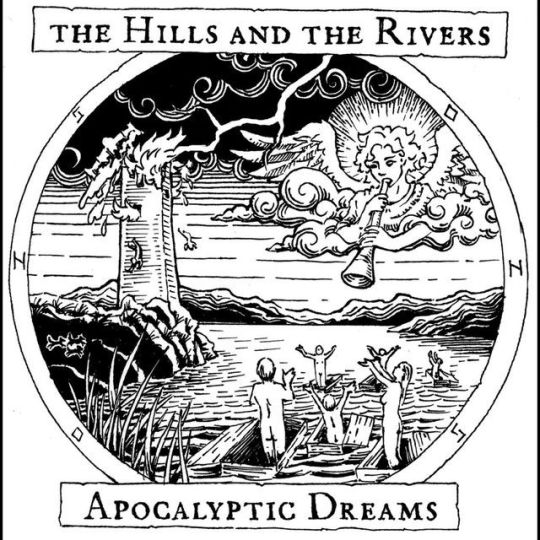
SUNDAY MATINEE MUSIC VIDEO “Dancin’ by the River (Tex-Mex Garage Mix)” https://www.youtube.com/watch?v=L14-hl4IEss — The lyrics came from a dream: I saw a clear summer day with a water baptism happening at Pine Creek, a scenic waterway that flows southward through north central Pennsylvania (and shown in this video). There was a romantic undercurrent between a man and a woman, visibly in love and grateful to be getting baptized. Surrounding them was a group of happy people having a festival—kind of like a Grateful Dead concert (minus certain substances).
This spicy jangly-guitar pop track was inspired by early Beatles, vintage Chicano rock’n’roll, Mexican gangster films, Roy Orbison’s “Pretty Woman,” and The Everly Brothers’s cover of "Lucille." On a cosmic jukebox it would play next to Richie Valens, Neil Diamond, and The Monkees ("Little Bit Me Little Bit You")—in fact, Davy Jones said it should be “top of the pops.” This recording (mixed by Tim Breon) has gotten airplay around the world and features the drum work of Bill Matlack, Jr. + vocals & percussion by evinrude a.k.a. Kevin Spyker. The song has been in my live set for years, including with Paul Farnham and The Gypsy Lizards, and the band October (with Ron Davis and Chris Haggerty).
youtube
#texmex #garagerock #pinecreek #pennsylvania #appalachia #baptism #beatles #chicano #rocknroll #mexican #royorbison #prettywoman #everlybrothers #lucille #richievalens #neildiamond #monkees #davyjones #johnnyjblair #timbreon #billmatlack #evinrude #kevinspyker #paulfarnham #rondavis #chrishaggerty #victorvalverde #october #singersongwriter #singeratlarge
#johnny j blair#singer songwriter#music#singer at large#pop rock#monkees#davy jones#Tex Mex#garage rock#Pine Creek#Pennsylvania#baptism#Beatles#Chicano#Rock & Roll#Mexican#Roy Orbison#Pretty Woman#Everly Brothers#Lucille#Richie Valens#Neil Diamond#evinrude#Youtube
5 notes
·
View notes
Text
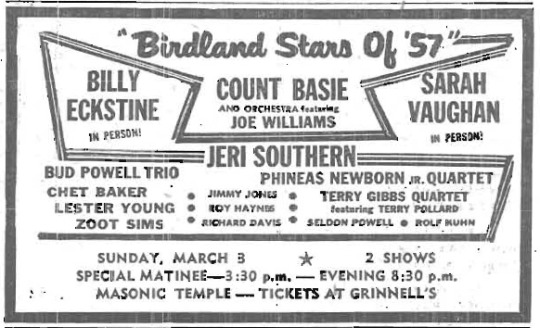
Birdland Stars of '57 - Masonic Temple - Detroit : Billy Eckstine, Count Basie and his Orchestra featuring Joe Williams, Sarah Vaughan, Bud Powell Trio, Phineas Newborn jr. Quartet, Chet Baker, Lester Young, Zoot Sims, Jimmy Jones, Roy Haynes, Richard Davis, Terry Gibbs Quartet featuring Terry Pollard, Seldon Powell, Rolf Kühn
#jazz#jazz ads#billy eckstine#count basie#joe williams#sarah vaughan#bud powell#phineas newborn#chet baker#lester young#zoot sims#jimmy jones#roy haynes#richard davis#terry gibbs#terry pollard#seldon powell#rolf kühn#1957
19 notes
·
View notes
Text
My favorite songs that I listened to in 2023 (in no particular order)
Mark Knight & Armand Van Helden - The Music Began To Play
Daft Punk - Revolution 909 (Roger Sanchez & Junior Sanchez Remix)
Oliver Tree & Robin Schulz - Miss You (Showtek Remix)
Armin van Buuren & Mr. Probz - Another You
Party Favor - Too Much
Sans Soucis - All Over This Party (Salute Remix)
Lil Wayne - A Milli (Sidepiece Remix)
Elvis Presley & Britney Spears - Toxic Las Vegas (Jamieson Shaw Remix)
Tiesto, Jonas Blue, & Rita Ora - Ritual
Gorillaz - Silent Running (feat. Adeleye Omotayo)
Mau P - Gimme That Bounce
Tiesto - Lay Low
Armin van Buuren & Stuart Crichton - Dayglow
Jay-Z & Linkin Park - Numb/Encore
Chuck Brown and the Soul Searchers - Bustin' Loose
Tiesto - 10:35 (feat. Tate McRae) [Joel Corry Remix]
Meduza and Eli & Fur - Pegasus
Whitney Houston - It's Not Right But It's Okay
Gorillaz - Skinny Ape
Red Vox - Forgetter
Olive T - We'll Maintain
Tchami - Shades (feat. Donnie Sloan & Ricky Ducati)
Climax Blues Band - Couldn't Get It Right
Mack Wilds - Own It
Calvin Harris - Miracle (feat. Ellie Goulding)
Genesi - Everything You Have Done (Meduza Edit)
Metro Boomin, The Weeknd, & Diddy - Creepin' (feat. 21 Savage)
Gorillaz - Tranz
Foster The People - Sit Next to Me
Tyga - I'm Gone (feat. Big Sean)
Avicii - Heaven
Calvin Harris - Miracle (feat. Ellie Goulding) [Hardwell Remix]
Sunday Scaries & Pickuplines - Chill Like That (Odd Mob Remix)
Gorgon City - Voodoo
The Weeknd - Popular (feat. Playboi Carti & Madonna)
Todd Edwards - The Chant (James Organ Remix)
Luke Combs - Fast Car
Armin van Buuren & Sam Martin - Wild Wild Son
Armin van Buuren & Sam Martin - Wild Wild Son (Richard Durand Remix)
Kaskade - Angel On My Shoulder
Deadmau5 & Kaskade - I Remember (John Summit Remix)
JC Stewart - Love Like That
Will K - Sun Is Dark
The Band - The Weight
Aqua - Barbie Girl (Tiesto Remix)
Notre Dame - Yumi (Tiesto Remix)
Meduza - Phone (feat. Sam Tompkins & Em Beihold)
Major Lazer - Particula (feat. DJ Maphorisa, Nasty C, Ice Prince, Patoranking, & Jidenna)
Major Lazer - Que Calor (feat. J Balvin & El Alfa)
The Specials - Ghost Town
The Chemical Brothers - Live Again (feat. Halo Maud)
The Chemical Brothers - No Reason
Swedish House Mafia - Ray Of Solar (Mau P Remix)
Swedish House Mafia - Ray Of Solar (Tiesto Remix)
Alesso - Caught A Body (feat. Ty Dolla $ign)
Armin van Buuren - Lose This Feeling (Dimension Remix)
Sia - Gimme Love (Armin van Buuren Remix)
The Beatles - Now And Then
100 gecs - Doritos & Fritos
Roy Davis Jr. & Peven Everett - Gabriel (Live Garage Mix)
Casso, Raye, & D-Block Europe - Prada
Tiesto, Tears For Fears, Niiko x Swae, & Gudfella - Rule The World (Everybody)
Doja Cat - Paint The Town Red
Fred again… & Baby Keem - leavemealone
Nicki Minaj - Let Me Calm Down (feat. J. Cole)
Nicki Minaj - Needle (feat. Drake)
Overmono - Good Lies
Tame Impala - Breathe Deeper (Lil Yachty Remix)
Drake - First Person Shooter (feat. J. Cole)
Drake - Virgina Beach
Meduza, Ferreck Dawn, & Clementine Douglas - I Got Nothing
Todd Edwards - Perfect Love (Biscits Remix)
Todd Edwards - When Your Alone (A-Trak Remix)
Fred again…, Skrillex, & Four Tet - Baby again… (feat. Lil Baby)
Lil Yachty - The Secret Recipe (feat. J.Cole)
Lil Uzi Vert - Just Wanna Rock (Malivai & Afrojack Remix)
070 Shake - Cocoon (Martin Garrix & Space Ducks Remix)
Ice Spice - In Ha Mood (O'Flynn Remix)
Gunna - fukumean (Diplo, Maesic, & Chad Harrison Remix)
John Summit - Where You Are (feat. Hayla)
Parisi, Steve Angello, & Sebastian Ingrosso - U Ok?
David Guetta & Hypaton - Be My Lover (2023 Mix) (feat. La Bouche)
Killer Mike - RUN (Damian "Jr. Gong" Marley Version)
Elton John - Daniel
Disclosure - Higher Than Ever Before
Alesso & John Newman - Call Your Name
Pete Rock & C.L. Smooth - They Reminisce Over You (T.R.O.Y.)
Nick Jonas - This Is Heaven
Black Sheep - The Choice Is Yours
Davido - UNAVAILABLE (feat. Musa Keys) [Major Lazer Remix)
James Hype & Major Lazer - Number 1
Willie Hutch - Tell Me Why Our Love's Turned Cold
John Summit - Veridis Quo vs. Human (Daft Punk vs. John Summit)
Kendrick Lamar - Money Trees (Duke & Jones Remix)
Missy Elliott - 4 My People (feat. Eve) (Basement Jaxx Vocal Mix)
Flowdan, Lil Baby, Skrillex - Pepper
Steve Angello - Rejoice (feat. T.D. Jakes)
Danger Mouse & Black Thought - Strangers (feat. A$AP Rocky & Run The Jewels)
Metro Boomin & Future - Too Many Nights (feat. Don Toliver)
Skrillex, Missy Elliott, & Mr. Oizo - RATATA
Chase & Status and Bou - Baddadan (feat. Irah, Flowdan, Trigga, & Takura)
Lil Yachty - Strike (Holster)
#music#edm#hip hop#daft punk#armin van buuren#tiesto#john summit#swedish house mafia#fred again#nicki minaj#drake#missy elliott#metro boomin#major lazer#lil yachty#gorillaz#todd edwards#j cole#alesso#skrillex#flowdan#lil baby#best music of 2023
6 notes
·
View notes